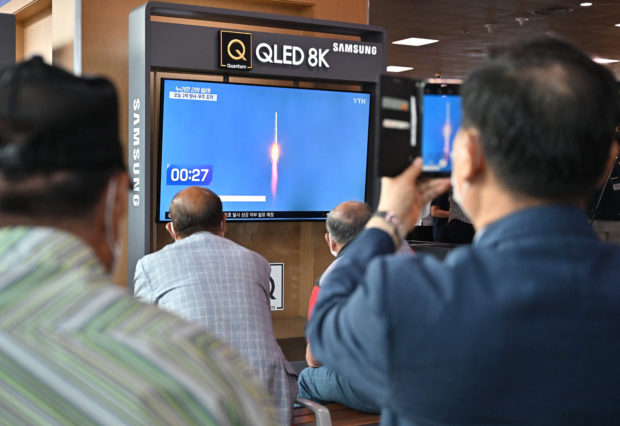
People watch a television screen showing live footage of South Korea’s homegrown space rocket Nuri, at a railway station in Seoul on June 21, 2022, as the 200-ton Nuri blasted off from the Naro Space Center on the south coast in the second attempt to put satellites into orbit after a launch last October failed. AFP
SEOUL — South Korea launched its first domestically-developed space rocket on Tuesday, television pictures showed, the country’s second attempt after a launch last October failed.
The Korea Satellite Launch Vehicle II, a 200-tonne liquid fuel rocket informally called Nuri, lifted off from the launch site in Goheung at 4:00pm (0700 GMT), with a commentator saying: “it seems it’s going according to the plan”.
South Korea’s second test launch of its homegrown space rocket comes eight months after the first test failed to put a dummy satellite into orbit, a setback in the country’s attempt to join the ranks of advanced space-faring nations.
All three stages of the rocket worked in the first test last October, with the vehicle reaching an altitude of 700 kilometers (430 miles), and the 1.5-ton payload separating successfully.
But it failed to put a dummy satellite into orbit after the third-stage engine stopped burning earlier than scheduled.
“Nuri separates dummy satellite,” South Korea’s YTN Television reported minutes after lift-off, adding shortly after that the launch “appears to be a success”.
In Tuesday’s test, in addition to the dummy satellite, Nuri carried a rocket performance verification satellite and four cube satellites developed by four local universities for research purposes.
The three-stage Nuri rocket has been a decade in development at a cost of 2 trillion won ($1.5 billion).
It weighs 200 tonnes and is 47.2 meters (155 feet) long, fitted with a total of six liquid-fuelled engines.
In Asia, China, Japan and India all have advanced space programs, and the South’s nuclear-armed neighbor North Korea was the most recent entrant to the club of countries with their own satellite launch capability.
RELATED STORIES
South Korea readies second attempt to send homegrown rocket to orbit
S. Korea’s Moon vows ‘Korean space age’ after mixed rocket test results
South Korea test-fires first indigenous solid-fuel rocket, pushes to launch spy satellites